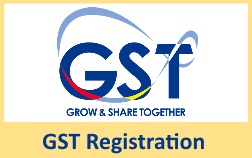How to Discover the most effective GST Registration Services in Singapore Quickly
How to Discover the most effective GST Registration Services in Singapore Quickly
Blog Article
Throughout: The Ultimate Roadmap to GST Registration for Companies Looking For Financial Security
Navigating the intricacies of Item and Solutions Tax (GST) registration is a vital action for companies pursuing financial security. From recognizing the essential principles of GST to abiding by post-registration guidelines, the process can seem discouraging in the beginning glance. Breaking down the roadmap right into convenient steps can improve the enrollment journey for organizations looking to enhance their monetary standing. Allow's check out the important parts that compose this best roadmap and uncover just how each phase adds to laying a strong structure for financial success.
Understanding GST Fundamentals
Digging right into the basic principles of Product and Services Tax (GST) is essential for obtaining an extensive understanding of its effects on companies and the economy. Input Tax Obligation Credit History (ITC) is a significant attribute of GST, enabling businesses to assert credit history for tax obligations paid on inputs, decreasing the general tax worry. Comprehending the basics of GST is critical for services to comply with tax policies, handle their finances effectively, and contribute to the country's financial growth by taking part in a clear tax obligation system.
Qualification Standards for Enrollment
To sign up for GST, businesses should satisfy certain qualification standards established by the government. The key qualification need is that any type of company involved in the supply of items or solutions with a yearly accumulation turnover over the threshold limitation set by the authorities should register for GST. Since the present guidelines, the threshold limitation for GST registration is a yearly accumulation turnover of 40 lakhs for companies operating within a state, other than for unique category states where the limitation is 20 lakhs. Furthermore, certain businesses are called for to sign up for GST irrespective of their turn over, such as interstate distributors, laid-back taxable persons, and businesses reliant pay tax obligation under the reverse fee system. It is critical for organizations to extensively assess their turnover and deal kinds to establish their GST enrollment commitments accurately. Failure to sign up for GST when eligible can lead to charges and legal repercussions, making it essential for services to abide by the defined eligibility standards.
Papers Needed for Registration
Having satisfied the qualification standards for GST enrollment, services must now ensure they have the requisite files in place to proceed with the enrollment procedure effectively. The files required for GST registration typically consist of evidence of business constitution, such as partnership deed, enrollment certification, or incorporation certificate for different types of businesses. Furthermore, businesses require to give papers developing the major location of service, such as a rental agreement or electricity bill.
Step-by-Step Registration Process
Starting the GST registration procedure entails a series of organized actions to make certain a seamless and certified registration for organizations. The primary step is to check out the GST site and fill in the enrollment kind with accurate details of the service entity. Following this, the applicant gets a Short-term Referral Number (TRN) which is utilized to resume the application process if it's not completed in one go.
Following, all required files based on the list offered by the GST portal requirement to be pop over here uploaded. These files commonly include proof of company address, identity and registration evidence of promoters, monetary declarations, and organization entity's PAN card.

Post-Registration Conformity Guidelines

Conclusion
In final thought, services seeking financial stability should understand the basics of GST, meet eligibility criteria, gather necessary documents, adhere to the step-by-step registration process, and adhere to post-registration standards - Best GST registration services in Singapore. By adhering to these actions, organizations can make certain compliance with tax policies and preserve monetary security in the future
Additionally, specific services are needed to sign up for GST regardless of their turn over, such as interstate suppliers, laid-back taxable individuals, and services liable to pay tax obligation under the reverse fee mechanism.Having met the qualification standards for GST registration, organizations need to now guarantee they have the requisite records in location to continue with the registration procedure efficiently. The records required for GST enrollment normally include evidence of business constitution, such as partnership useful content act, registration certification, or unification certificate for various types of businesses. In addition, services require to offer records establishing the primary area of company, such as a rental arrangement or electrical power costs.Commencing the GST enrollment procedure involves a collection of structured steps to make sure a compliant and smooth registration for organizations.
Report this page